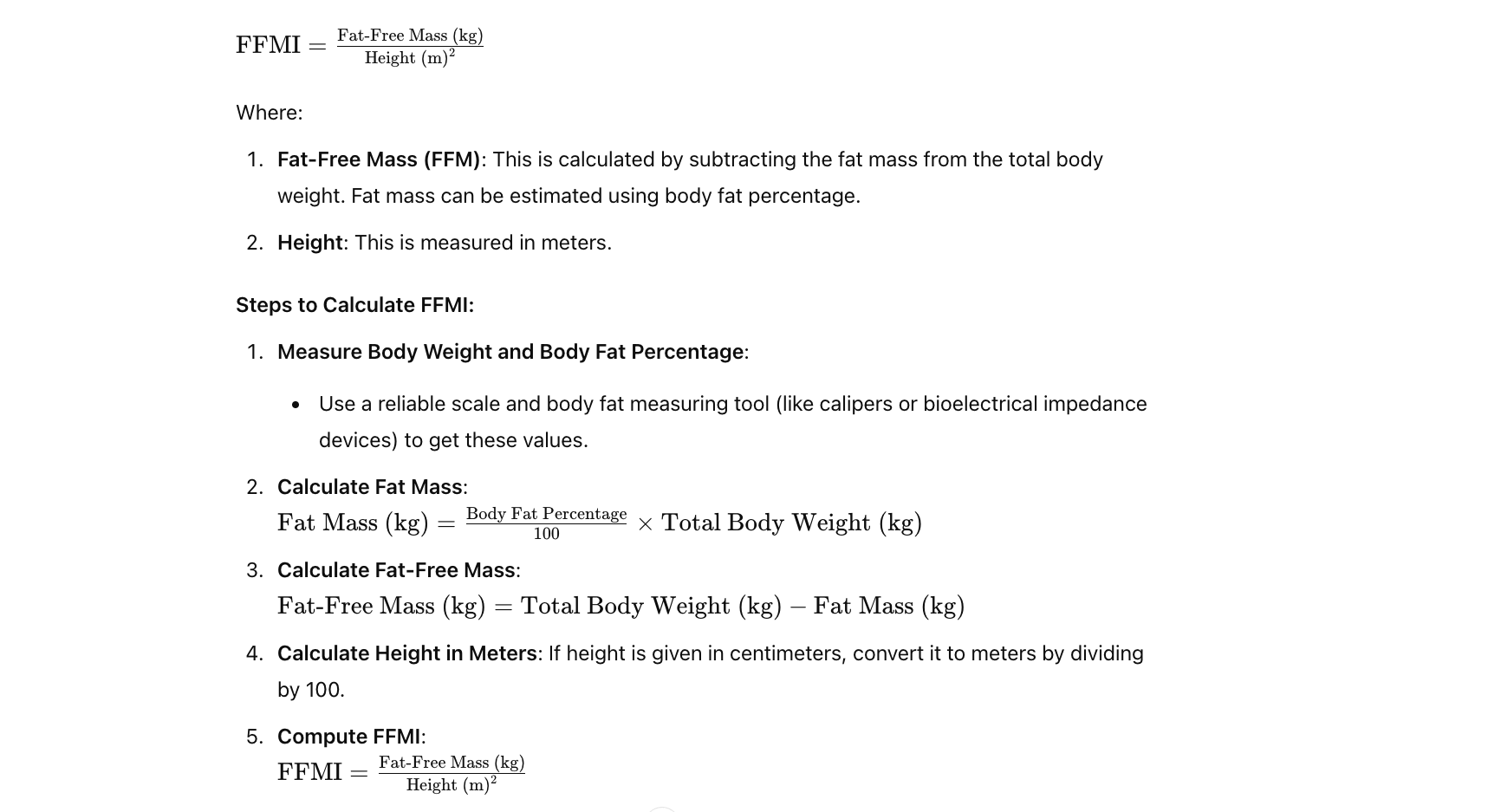The FFMI calculator (Fat-Free Mass Index) estimates an individual’s lean muscle mass relative to their height. FFMI is similar to Body Mass Index (BMI) but focuses on fat-free mass, making it a more accurate measure for athletes and bodybuilders with higher muscle mass.
While the FFMI (Fat-Free Mass Index) calculator is an excellent tool for measuring lean muscle mass, it’s important to understand how it differs from the more commonly known BMI (Body Mass Index) calculator. Both tools have unique applications and can complement each other in providing a comprehensive view of your body composition
FFMI Calculator
FFMI Calculator
How It Works
The FFMI calculator uses the following formula to calculate the Fat-Free Mass Index:

Benefits of Using an FFMI Calculator
- Accuracy for Athletes: Unlike BMI, FFMI accounts for muscle mass, making it a better metric for individuals with higher muscle density.
- Muscle Mass Assessment: Helps in assessing whether an individual’s muscle mass is within a healthy range.
- Training and Nutrition Insights: Provides valuable information for tailoring fitness and nutrition plans.
- Identify Potential Health Risks: High FFMI values can indicate excessive muscle mass, which may be linked to potential health issues.
- Monitor Progress: Useful for tracking changes in body composition over time, particularly for bodybuilders and athletes.
Interpreting FFMI Values
- Average Male: FFMI of around 19-20
- Athletic Male: FFMI of around 22-23
- Elite Bodybuilders: FFMI of 25-26 (natural limit)
- Average Female: FFMI of around 17-18
- Athletic Female: FFMI of around 19-20
FFMI Calculator Tool Instructions
- Enter Your Body Weight: Input your current body weight in kilograms.
- Enter Your Body Fat Percentage: Provide your body fat percentage. If unsure, use an estimation tool.
- Enter Your Height: Input your height in centimeters or meters.
- Calculate: Click the “Calculate” button to get your FFMI value.
Example Calculation
- Body Weight: 80 kg
- Body Fat Percentage: 15%
- Height: 180 cm (1.80 meters)
Steps:
- Fat Mass = 15% of 80 kg = 12 kg
- Fat-Free Mass = 80 kg – 12 kg = 68 kg
- FFMI = 68 kg / (1.80 m)^2 = 20.98
FAQs
Q: What is FFMI?
A: FFMI (Fat-Free Mass Index) is a metric used to estimate the amount of lean muscle mass relative to height. It provides a more accurate measure of body composition, especially for individuals with higher muscle mass, compared to BMI (Body Mass Index).
Q: How is FFMI different from BMI?
A: BMI (Body Mass Index) measures overall body mass relative to height but doesn’t distinguish between muscle and fat. FFMI specifically measures lean muscle mass, providing a more accurate reflection of body composition for athletes and bodybuilders.
Q: How often should I check my FFMI?
A: You can check your FFMI as often as you monitor your body composition, typically every few weeks to track progress effectively. Frequent monitoring helps adjust training and nutrition plans as needed.
Q: Is FFMI affected by age?
A: Yes, age can influence FFMI, as muscle mass tends to decrease with age. It’s important to consider age-related changes when interpreting FFMI values and to maintain a healthy lifestyle to preserve muscle mass.